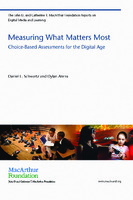Measuring What Matters Most
Choice-Based Assessments for the Digital Age
Author(s)
Schwartz, Daniel L.
Arena, Dylan
Language
EnglishAbstract
An argument that choice-based, process-oriented educational assessments are more effective than static assessments of fact retrieval.If a fundamental goal of education is to prepare students to act independently in the world—in other words, to make good choices—an ideal educational assessment would measure how well we are preparing students to do so. Current assessments, however, focus almost exclusively on how much knowledge students have accrued and can retrieve. In Measuring What Matters Most, Daniel Schwartz and Dylan Arena argue that choice should be the interpretive framework within which learning assessments are organized. Digital technologies, they suggest, make this possible; interactive assessments can evaluate students in a context of choosing whether, what, how, and when to learn.Schwartz and Arena view choice not as an instructional ingredient to improve learning but as the outcome of learning. Because assessments shape public perception about what is useful and valued in education, choice-based assessments would provide a powerful lever in this reorientation in how people think about learning.Schwartz and Arena consider both theoretical and practical matters. They provide an anchoring example of a computerized, choice-based assessment, argue that knowledge-based assessments are a mismatch for our educational aims, offer concrete examples of choice-based assessments that reveal what knowledge-based assessments cannot, and analyze the practice of designing assessments. Because high variability leads to innovation, they suggest democratizing assessment design to generate as many instances as possible. Finally, they consider the most difficult aspect of assessment: fairness. Choice-based assessments, they argue, shed helpful light on fairness considerations.
Keywords
educationISBN
9780262518376OCN
1100523975Publisher
The MIT PressPublisher website
https://mitpress.mit.edu/Publication date and place
Cambridge, 2013Classification
Education: examinations and assessment


 Download
Download